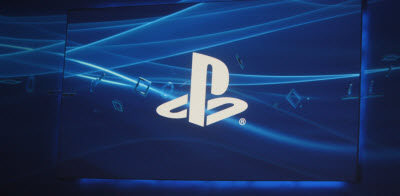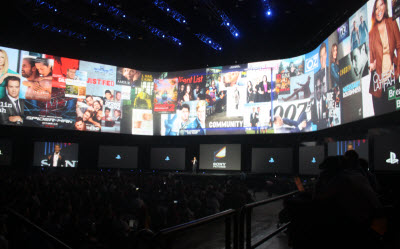GamesBeat: Do you have an idea of what reactions among gamers rated the highest?
Koller: In terms of just social sentiment or something like that? We do measure quite a bit. There was a lot around The Order. There was a lot around Watch Dogs. Lots around Destiny. The larger discussion has been around some of the policies, as you probably know very well. [Laughs] Content should never take a backseat, because that’s why we’re here. We’re here to give great gaming experiences. The fact that people were getting so excited about the types of ways they can play that are new – on all the new systems, but particularly here on PlayStation 4 – was great.
 amesBeat: Third parties and their exclusives these days are very tactical. It used to be that you could get Grand Theft Auto or Final Fantasy as an exclusive. Your main rival has closed the gap on those exclusives and gotten some advantage in some areas, like Call of Duty. It almost seems like there are more ways to do exclusives now, but they’re smaller. I’m not sure that they’re serving the purpose of winning over gamers from one side to another.
amesBeat: Third parties and their exclusives these days are very tactical. It used to be that you could get Grand Theft Auto or Final Fantasy as an exclusive. Your main rival has closed the gap on those exclusives and gotten some advantage in some areas, like Call of Duty. It almost seems like there are more ways to do exclusives now, but they’re smaller. I’m not sure that they’re serving the purpose of winning over gamers from one side to another.
Koller: This is an interesting area. When we got into the PS3 years, exclusivity of the kind you noted – “Hey, we’ve got Final Fantasy and GTA and the EA Sports games” – was no longer possible on PS3 and 360 because of cost. You’d have to go to the publisher and say, “I will cover your incremental costs that you would have made on that other platform.” Given development costs now, those P&Ls rarely made sense.
We started looking at things like, “OK, can we add a character here or a weapon here?” Those didn’t move the needle as much, to your point. What did start moving the needle is 30-day early exclusivity on DLC, and in some cases hours of gameplay that might be added to that. We had a partnership with Warner for the original Batman: Arkham Asylum. We called it our “Batman Moment,” because we started seeing that there were changes in the way you could add exclusivity on certain types of features. That would change index rates, change the bias in the market away from what would traditionally—if you look at the market, you could say, “OK, the installed base should be X and the index rate should be Y based on how many units are in the market.” You could change that.
The way we started coming into this cycle is we said, “Let’s think about the partners and the publishers who want to stand for gaming.” I’ll tell you, all of them do. That’s their core business. We lined up virtually everybody. You’ve seen everybody on their stage, and they all wanted to be able to use some type of exclusivity, because of what we stand for. Destiny is a great example of that. You start looking at hours of gameplay and the comarketing portions and the other things that start to move numbers. That’s a better way to do exclusivity now. Simply buying out the game is really not possible.
The other thing I’ll say is, I don’t think many publishers want to anger the other side. If they go into a partnership with one side or the other, they’ll give a considerable amount, but saying, “We won’t launch on the other side” can anger the other platform holder for future games, not just that franchise.
GamesBeat: Is there anything you can explain about the Destiny partnership? Do you think there’s an advantage there?
Koller: Unequivocally, there’s an advantage there. I don’t know if we’ve made it all public. But it is a very significant partnership that will be—it’s not an exclusive. They’re obviously launching on Xbox One as well. But that’s a title and a franchise that is of critical importance to us. When you look at how strong that game will be at bringing gamers over to our network, we think that’s going to have an important role to play.
 GamesBeat: You mentioned that the used games system was working OK. I think publishers and developers may have felt like, “Well, where’s our share of that pie?” With the fees issue, this is something that they want to change, I think.
GamesBeat: You mentioned that the used games system was working OK. I think publishers and developers may have felt like, “Well, where’s our share of that pie?” With the fees issue, this is something that they want to change, I think.
Koller: That’s been a popular—I don’t want to call it a misconception, but if you look at things like Peter Moore the other day, saying that his personal opinion is that used games are good, or Ubisoft coming out and saying they feel the same—one thing we’ll say about used games is that we do believe used games imbue frontline purchase. That wallet is not used for used games necessarily. That wallet can be used for frontline. The incrementality that comes out of that frontline purchase benefits the industry. It certainly benefits the publisher. It benefits the platform holders. It benefits retail, clearly.
We think it’s an accelerant to frontline sales. We’ve been clear about that. There has been recent research about that, too. Used games work. We view it that way, and most important, consumers view it that way. If gamers are saying this is how they enter into our category, this is how they participate, it’s really a challenge for anyone to say that they can’t do that.
We’ve had a lot of research come back from gamers saying that if used games were ever removed from this industry, they’ll leave this industry and go to mobile and tablet. We have no intention of removing used games from our ecosystem. Now you see the reaction when used games are restricted in some way on competitive platforms. The gamer reacts accordingly.
GamesBeat: Back to games, did you feel like all of the reactions you got were expected, or did you expect any of the other games to show better as well?
Koller: We did expect a great reaction to the games, because I think many people are hungry for what the next-generation content looks like. We’ve launched a YouTube channel that unveils specific content as we go through this summer. The graphics are going to be fantastic, obviously, but the gameplay is also so much deeper and richer. The idea that the core gamer is all that’s left in the gaming industry is old thinking. There are plenty of people, millions of people, that can’t wait for the next generation.
GamesBeat: Do you guys believe that the consoles are significantly different, between Microsoft and Nintendo and Sony, as far as what they can do?
Koller: There are specific differences. We’ve been clear that the PlayStation 4 is the most technologically advanced box. That’s true. We also know, from our history, that the most technologically advanced box doesn’t necessarily always win. The best way to build a sense of confidence and purpose in your gaming community is to have the best content and the most clean, efficient, user-friendly policies at a very achievable price. Those were the three things we looked at. We hit on all three of those.
There are philosophical differences that are starting to appear, though. Xbox, very clearly, is saying that they think there’s maybe more of a digital entertainment direction. Nintendo is trying to get back into the core market. We’ve been very open about standing for gaming. It’s our heritage, from PS1 to PS2 to PS3 and now PS4. The philosophical part, maybe, is more interesting than the tech specs and some of the policies.
GamesBeat: Is there any worry that Microsoft has a lot more cash and can win in a price war?
Koller: [Laughs] Well, anybody can look up their cash position. Maybe a better way to look at it is how the companies view the future. Do you view it as a means by which you’re opening yourself up to a wider range of competition? That’s what Xbox is doing. Or do you view it as a focused approach? That’s what we’re doing. We think the focused approach is better. We’re able to talk directly and clearly about our policies and what we stand for.
GamesBeat: Some of the other things you announced in February, like the interaction with the Vita, has that gone over well? Do people understand how they can use that?
Koller: We’ve had a nice initial reaction to Vita this week in the market, I can tell you that. We have some work to do on that as far as clarifying how that works, but it will make Vita a very exciting proposition that I don’t think a lot of people knew was coming when we first launched the Vita. We’ve planned it all along. The operating systems talk to each other. Vita can play PlayStation 4 games through remote play.
The promise of remote play has been there for a long time, but we haven’t been able to get the game portion of that. We’ve had video and music and photos, but gaming – with a few minor exceptions – hasn’t been part of that. Now the technology has advanced to the point where we can do that. The brilliance of that Vita screens showcases the PlayStation 4 content beautifully. I was looking at Killzone on it. It’s incredible. Those who are Vita owners will be very excited by this. Those who aren’t, I think, will view it as an opportunity, a second screen to use when someone else is playing with the PlayStation 4.
GamesBeat: Do you have anything else to say today?
Koller: I want to say one thing. There’s no victory lap at PlayStation. I want to make that clear. There’s a lot of work to do. I say this to my team a lot, and I do it in a sports analogy – the San Antonio Spurs are up 2-1 [over the Miami Heat as of Game 3 of the NBA Finals — Ed.], but they’re not throwing a parade. We’re in the same boat. We have formidable competitors. We had a great week. It’s back to work on Monday.
Image credits: Leonard Lee, Dean Takahasi, and Sony
VentureBeat's mission is to be a digital town square for technical decision-makers to gain knowledge about transformative enterprise technology and transact. Learn More
